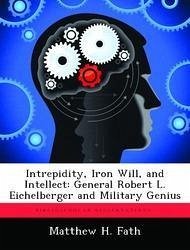
Intrepidity, Iron Will, and Intellect: General Robert L. Eichelberger and Military Genius
Versandkostenfrei!
Versandfertig in über 4 Wochen
52,99 €
inkl. MwSt.

PAYBACK Punkte
26 °P sammeln!
There are currently two contradictory schools of thought in the historiography of General Robert L. Eichelberger's generalship. One group of authors, John Shortal and Jay Luvaas, consider Eichelberger a brilliant World War II commander. Another author, Paul Chwialkowski, believes Eichelberger to be good, but not distinguished. This study attempts to develop a concise judgment of Eichelberger's leadership. The research analyzed Eichelberger's generalship using Clausewitz's theory of military genius as a model. The first step was to define military genius and to determine its components and subc...
There are currently two contradictory schools of thought in the historiography of General Robert L. Eichelberger's generalship. One group of authors, John Shortal and Jay Luvaas, consider Eichelberger a brilliant World War II commander. Another author, Paul Chwialkowski, believes Eichelberger to be good, but not distinguished. This study attempts to develop a concise judgment of Eichelberger's leadership. The research analyzed Eichelberger's generalship using Clausewitz's theory of military genius as a model. The first step was to define military genius and to determine its components and subcomponents. Next, Eichelberger's pre-World War II education, mentorship, and training experiences were evaluated. The third step was to analyze Eichelberger's generalship during the Papua New Guinea, Netherlands New Guinea, and Philippines Campaigns of World War II to determine if he consistently demonstrated the qualities of military genius. This study concluded that Eichelberger definitively displayed the components of courage and determination but a judgment on his coup d'oeil required a more detailed examination and warranted further research. Eichelberger's leadership is relevant to today's military officer because he successfully defeated an enemy who employed many asymmetrical tactics of potential enemies in the contemporary operating environment: antiaccess denial, defense in complex terrain, and fanatical fighting abilities.


